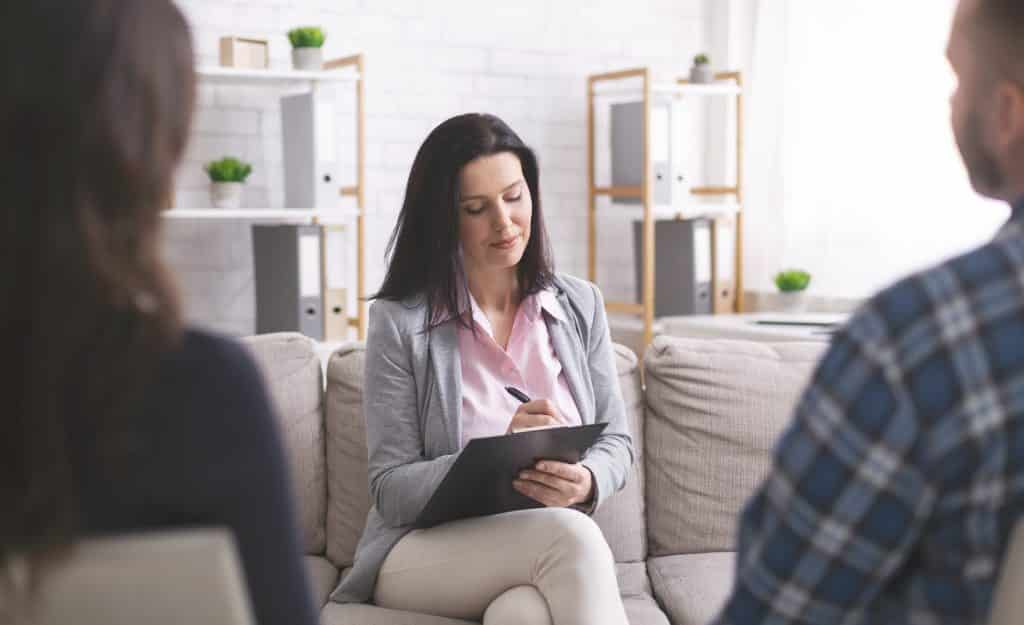If you’re frequently unable to develop or maintain an erection sufficient for intercourse, it’s possible you have erectile dysfunction, or ED. Discussing ED with your partner can feel awkward, but it’s important to talk things over with your partner so you can work together to find a solution that has as minimal of an impact on your relationship as possible.
Wondering if your symptoms may qualify as ED? Take our free Symptom Checker Quiz today.
What to Know About ED Before Talking to Your Partner
It’s not your (or your partner’s) fault.
A common misconception is that a man experiences erectile dysfunction because he’s not aroused (or “turned on”) enough, which can open the door to blaming yourself or your partner for things that might be irrelevant to the root cause of the issue. It’s not only unfair, but oftentimes, it’s inaccurate — ED can be caused by a number of complex factors, such as underlying physical or mental conditions or issues with blood supply. There’s no need to feel guilty, assign blame or apologize.

It’s a common issue.
One major study found that roughly half of all men will experience some degree of erectile dysfunction. It’s estimated that ED affects around 30 million men in the United States, and while it becomes more common with age, ED can affect men at many different stages of life. If you feel alone, you’re definitely not — it can help to reach out to other men experiencing similar challenges through outlets like men’s health forums or Facebook groups.
It’s treatable.
ED is far from permanent — there are a number of ways to treat your symptoms (including medications and therapy) that can minimize its impact on your relationships and sex life. Your healthcare provider can help you find the right treatment for you.

How to Discuss Your Erectile Dysfunction With Your Partner
When and where is the right time to talk about ED?
It’s important to discuss topics like this when you and your partner are both in a place in your relationship where you’re comfortable and open to conversation around this topic. Most couples won’t feel comfortable discussing something like ED in a public place, and catching your partner when they’re feeling particularly stressed or upset may mean they’ll be less receptive to hearing about it. Additionally, broaching the topic during sex may seem like a natural fit, but heightened emotions in the moment may not make it the most productive time to hold a discussion.
Finding a private, relaxed moment when you’re both in the right headspace to be supportive will take a lot of pressure off the conversation. This might be when you’re sharing a drink, watching your favorite show together, or taking a walk or a long drive.

Embrace open communication.
ED is a deeply personal issue for most men; as such, you should be ready to discuss any challenges you’re facing openly and honestly. Once you’re able to comfortably approach topic of sex with your partner, you can acknowledge that you’ve had some difficulty maintaining an erection at times. You can use this moment to reassure your partner that this is not their fault. Address any insecurities that may come up; it can also be important to reassure your partner that this has nothing to do with shortcomings on their part or yours — understand that ED is caused by outside factors that neither of you has immediate control over.
Once you share your thoughts and feelings, make sure to give your partner an opportunity to respond and express their own feelings as well. It’s OK to be emotional if those feelings come up, but remember that the conversation is a give and take — focus on keeping your ED conversation on track and know that there are ways to treat symptoms safely and effectively. Most partners will be supportive and willing to listen to any concerns you may have; if they’re finding the conversation difficult, try sharing some educational resources to help answer any questions or concerns they may have.

Discuss possible next steps.
Now that you’ve brought your concerns out into the open, you can work on finding a solution together. ED is very treatable, with various solutions available depending on the underlying cause of your symptoms and your lifestyle. Some of these treatments include:
- • Oral medications, such as sildenafil
- • Injectable medications, such as TriMix
- • Talk therapy
- • Vacuum devices to increase blood flow
Many men experience internal stigma when it comes to seeking treatment for ED, but with the support of a partner, appropriate treatment can resolve your symptoms and improve your sex life overall. When you’re ready to pursue treatment, talk to your healthcare provider to help decide on the right course of action for you.

I’m still not ready to discuss ED with my partner. When should I seek outside help?
That’s OK! If you still feel uncertain about broaching the topic of ED with your partner, bringing in a professional sex therapist may be helpful. A sex therapist is a mental health practitioner with additional training in human sexuality. They specialize in helping individuals and couples with concerns they have surrounding physical intimacy through talk therapy, including addressing ED.
There are a number of online resources, like Psychology Today, which can help you find a reputable sex therapist located nearby, or match you with one that provides telehealth services.

My partner has ED. What should I do?
If you’ve noticed your partner experiencing the symptoms of erectile dysfunction, discussing it can be difficult, especially if they have yet to bring up the topic themselves. There are a few things you can do to help make the conversation go as smoothly as possible:
1. Educate yourself.
Understanding the symptoms, causes and treatments for ED is an important part of having a productive, supportive conversation with your partner. Coming to the table with reputable information can take the pressure off your partner and help you approach the discussion from a place of compassion and understanding. Some good places to start are:
- • What Is Erectile Dysfunction?
- • What Causes Erectile Dysfunction: Top Causes of ED in Men
- • 5 Questions to Ask Your Doctor About ED
- • Symptom Checker Quiz: Do I Have Erectile Dysfunction?

2. Be open and supportive.
The advice above is applicable not only to the partner experiencing ED, but to yourself as well. Finding the right time to talk, approaching the topic openly and honestly, educating yourself, and reassuring your partner will help facilitate a productive conversation.
3. Let your partner know you’re OK with ED treatments.
While it might not seem like a big deal, your partner may feel insecure about starting treatment. Many men struggle with the idea of what their partner may think about their use of ED treatments like oral medications and injectables. Letting them know that you’re comfortable with them using prescription medications to reduce the severity of their ED and supporting them can mean a lot to someone who’s afraid to seek out treatment.
On the other hand, avoid pressuring your partner into immediate treatment. Some men may need more time to consider their options before pursuing treatment — let your partner handle it in their own time, but let them know you’ll be there for them when they’re ready.

Taking the next step: what should I do after discussing with my partner?
Once you’ve talked with your partner, the next step to resolving your ED is seeking treatment from a healthcare provider, such as your primary care physician or a urologist.
Need help getting started? We’ve compiled 5 essential questions to ask your doctor about ED, along with a free checklist of information to prepare ahead of your appointment and additional questions that may be helpful to bring up.
With appropriate care, ED doesn’t have to be a barrier to a healthy relationship. And taking charge of your treatment with the support of your partner can make it all the easier to resolve your concerns and experience a more satisfying, enjoyable sex life.



